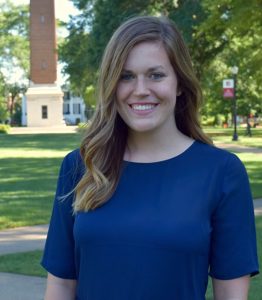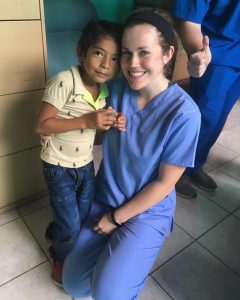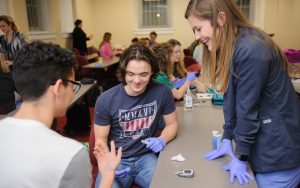
Alex Huechteman arrived at The University of Alabama with an idea of what she wanted to study, but the Honors College student soon discovered a path that would take her to Nicaragua to study a segment of rural population for the first time.
A track and soccer athlete in high school, the Frisco, Texas, native started her academic career majoring in kinesiology with plans of physical therapy school in her future. But during her freshman year, she became intrigued by a different medical field.
“I took a chemistry class and was fascinated by anatomic level processes and internal medicine,” said Huechteman. “I liked the challenges it presented, and I decided to switch my major to public health during my second semester.”
Huechteman selected public health because she loves to talk about various areas of health care, including epidemiology and patterns of disease, among others. She also had the opportunity to research one of today’s hotly debated medical topics.
“After taking several classes, I discovered I was passionate about health care systems and the politics of health care and health insurance,” said Huechteman. “I started to think about how I’m going to enter the field as a provider one day and quickly became interested in health care policy.”
A Clinical Experience in Nicaragua
When Huechteman was a sophomore and Honors College ambassador, she saw a blurb in a newsletter about the Nicaragua Clinical Experience, an Honors College program that allows UA students to learn and serve at the La Clinica Alabama-Granada in Granada, Nicaragua. She immediately was intrigued because the program involved a combination of medicine, underserved communities and intercultural interaction. She was accepted into the program and lived with a host family for two weeks following her sophomore year.

Huechteman’s days were split between working in the volunteer-run clinic in the morning and taking Spanish classes in the afternoon. At the clinic, she would shadow physicians, collect vital signs, monitor diabetic patients and help dispense medication in the pharmacy.
“Alex excelled in patient care and interaction,” said Dr. Alyssia Miller, faculty director of the Nicaragua Clinical Experience. “She constantly looked for opportunities to interact with patients, and she truly cares for the patient as a person and sees them as more than just a sickness or treatment.”
And while Huechteman enjoyed her Spanish classes, she says the time spent with her host family allowed her to fully immerse herself into the culture.
“I learned more Spanish living with my host family than all of my Spanish classes combined,” said Huechteman. “I spent each day meeting vibrant, compassionate people gaining far more out of life with much less. At the close of the trip, I already knew I wanted to go back.”
When she was able to apply, Huechteman quickly jumped at the opportunity to be a student facilitator, a role that normally involves assisting the program’s faculty leader with lectures and preparing students before their trip abroad, all while on campus. But not long after being selected, Dr. Ross Bryan, assistant dean of the Honors College, gave the group of three student facilitators a rare opportunity to develop a research project and travel back to Nicaragua.
“When we looked at literature about Nicaraguan health, all of the national data came from hospitals and labs in the capital of Managua,” said Huechteman. “We serve a rural population and there wasn’t much published information about the people we see at the clinic in Granada.”
An Opportunity for International Research

Due to the lack of health care information in rural communities like Granada, the group designed a community needs assessment based on a World Health Organization survey to better understand health behaviors, access to health care and demographics of patients visiting the clinic. While most of the research was qualitative, Huechteman said they added some thematic coding because most of the patients told stories.
“We learned that while poverty is a big issue in the community, their needs go far beyond a problem of not being able to eat healthy foods or having access to hospitals,” said Huechteman. “They’re experiencing political issues and social support deficits as well.”
According to Miller, the student facilitators were the first team to conduct international research at the Nicaraguan clinic.
“Our goal is to get the information to donors and nongovernmental and missions organizations that serve the country to better allocate resources,” said Huechteman. “We want to bring awareness to the community’s needs.”
Huechteman’s experiences in the Honors College and Nicaragua have not only forged a path for her future, but they will also be an inspiration for future UA Honors College students. She recently co-authored a chapter dedicated to engaged scholarship and service that centered around her time abroad in the Honors College’s “Common Book.”
“My goal for college was to feel prepared for physician assistant school when I graduated. I absolutely feel I’m ready because of my time inside and beyond the classroom at UA.” Alex Huechteman
After graduation in May, Huechteman will enroll in the physician assistant program at the Baylor College of Medicine in Houston. She chose the program because of its emphasis on health care for Spanish-speaking populations.
